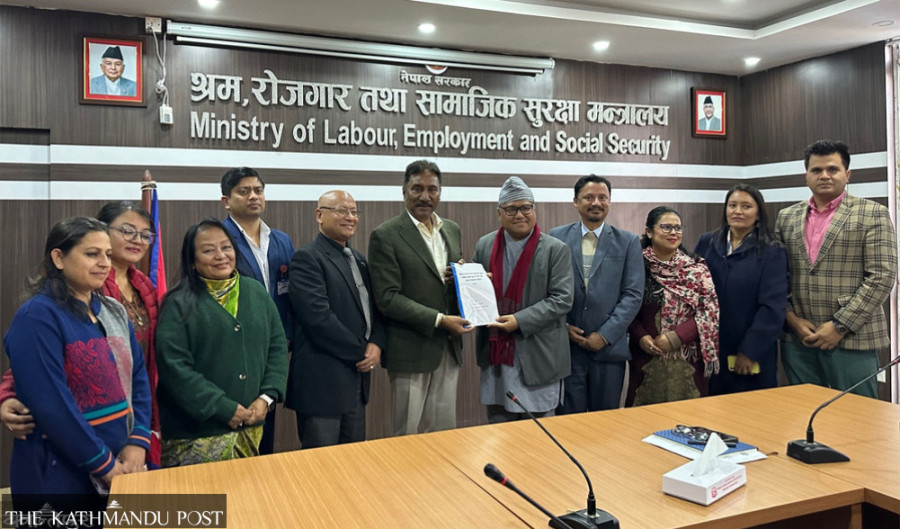National
Government task force urges health screening reforms to protect Nepali migrant workers
Calls for setting up a Centralisd Digital Repository System for thorough health checks in line with international standards.
Hom Karki
Amid growing concerns over severe health risks faced by Nepali migrant workers, such as heart and kidney failures due to heat stress, experts have recommended a complete overhaul of health screening protocols for those heading for foreign employment. The proposed measures aim to establish a Centralised Digital Repository System (CDRS) to ensure comprehensive and high-quality health checks for workers.
A specialised task force led by Dr Dipendra Raman Singh, secretary at the Ministry of Health and Populations, submitted its findings to Minister for Labour, Employment and Social Security Sharat Singh Bhandari.
The team with 30 experts comprising specialists from major hospitals including the National Academy of Medical Sciences/Bir Hospital, Tribhuvan University Teaching Hospital, Patan Academy of Health Sciences, and the Sukraraj Tropical Hospital discovered significant gaps in current health screening practices.
The report stresses the need for a systematic approach to prevent malpractices in medical fitness reports, pointing out that many current health checks do not meet proper standards. Shedding light on the relevance of the report, Dr Singh highlighted the dangers posed by substandard testing, explaining that it compromises worker safety.
“We observed that quality health assessments are lacking, and what is currently being done does not constitute a genuine health examination,” he said.
The findings also call for a thorough revision of how the causes of deaths among workers abroad are documented, as many death certificates lack detailed explanations, often citing vague terms such as “natural” or “sudden” death. The task force underscored that better tracking and recording of health data from recruitment to employment abroad could help mitigate risks and protect workers’ health.
The report reveals that inadequate or inaccessible health checks lead to premature deaths among workers abroad. The Foreign Employment Board states that around 1,000 Nepali workers die annually, with a total of 14,666 deaths recorded over the past 14 years (2008-09 to 2021-22). Key causes include cardiac arrest (19 percent), natural causes (19.5 percent), workplace accidents (7 percent), road incidents (12.7 percent), and suicide (11 percent).
Professor Dr Sunil Kumar Joshi, director of the Nepal Injury Research Centre and a member of the task force, pointed out the absence of adequate occupational health training for workers, leading to preventable deaths. He emphasised the importance of informing workers about industry-specific risks and preventive measures before they leave for job destinations.
The report suggests that Nepal’s health institutions need to be standardised according to international guidelines, recommending a unified process to match the health checks required by labour destination countries. This could involve strengthening diplomatic efforts to align with standards in countries like Saudi Arabia, Qatar, Malaysia, Israel, South Korea, Australia, and European nations. It also calls for better regulation and supervision of health institutions to prevent malpractices.
The inspections by a team led by an under-secretary on August 29 last year uncovered severe negligence, such as conducting health checks without real examinations, using substandard labs, and preparing reports without required equipment or staff. Following these findings, the Ministry of Labour, Employment and Social Security suspended 67 health institutions for failing to meet standards, only allowing the renewal of those that complied.
The report proposes that visa centres and health testing facilities be established in regions such as Bhairahawa and Pokhara to decentralise access and align with international practices. Minister Bhandari praised the report, stating, “Health checks should not be viewed as a mere commercial activity. They are connected to the life of the workers and need to be implemented with utmost seriousness. This report will contribute significantly to enhancing our migration policies.”




 10.12°C Kathmandu
10.12°C Kathmandu















